Introduction of Rwandan coffee beans: description of flavor and taste characteristics of Rwandan coffee beans
Professional coffee knowledge exchange more coffee bean information please follow the coffee workshop (Wechat official account cafe_style)
Today, Qianjie would like to introduce you to Rwandan coffee. Rwanda is located in Central Africa, is a landlocked country, close to Ethiopia and other major coffee producers. According to reason, Rwanda's coffee industry should be affected by the surrounding coffee countries, and the coffee industry should not be much worse. Here in Qianjie, I will give you a brief account of why.
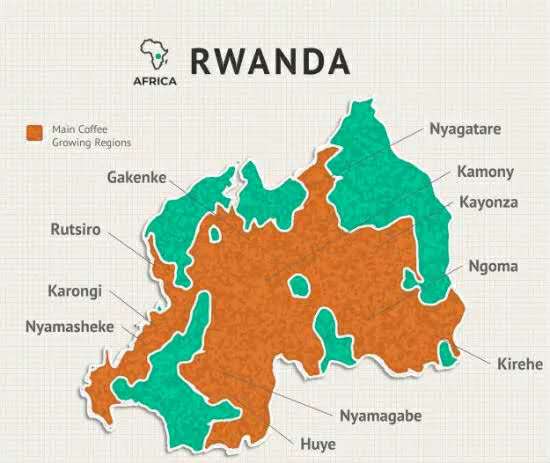
According to Qianjie, a major event took place in Rwanda in 1994. The genocide between the Hutu and Tutsi ethnic groups has resulted in the loss of nearly 1 million lives. Coupled with the sudden drop in global coffee prices at that time, it had a huge impact on the coffee industry in Rwanda.
After the genocide, Rwanda lost a large amount of its labour force, leaving only women and children. At that time, the economic level of Rwanda was very low. In order to enhance its economic strength, combined with the national conditions of Rwanda at that time, we could only rely on growing coffee to improve people's living standards. According to Qianjie, coffee production at that time did have a positive impact on the overall economic recovery of Rwanda.
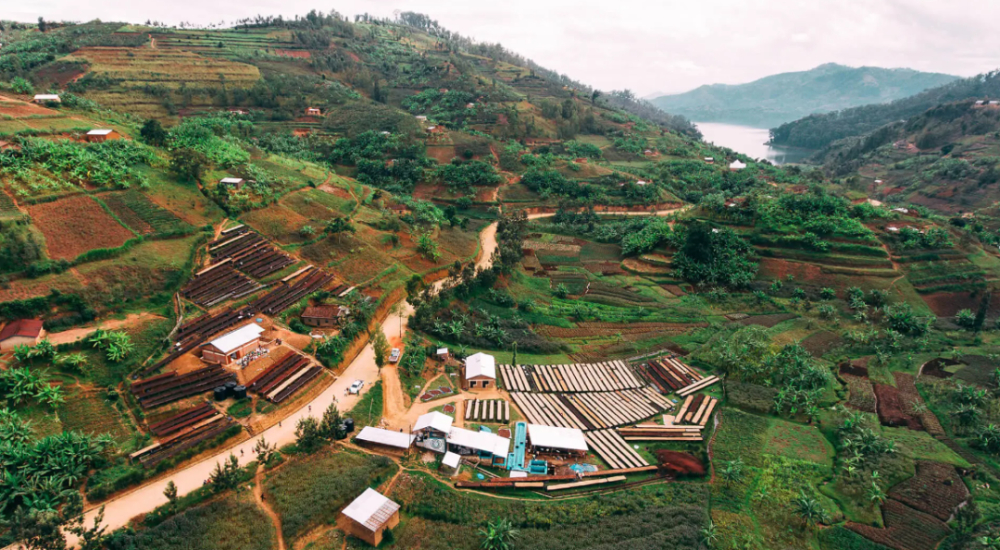
Although Rwanda is a very famous coffee producing area on the African continent, we rarely drink coffee from Rwanda on the market, and there is only one Gesak coffee on the front street for very complicated reasons. At the beginning of the 20th century, Rwanda was colonized by Germany and Belgium, and German missionaries were the first to introduce coffee to the hinterland of Africa. The planting area gradually extends from the earliest kivu area to the whole country, and most of the Rwandan coffee is a variety of bourbon coffee. At that time, the Belgian government strictly suppressed the quality of coffee exported from Rwanda, forcing the Rwandan coffee industry to be "high-yield, low-quality" low-cost coffee, when there were few real coffee washing stations in the country.
It was not until the independence of Rwanda and the establishment of the first official coffee organization, OCIR, that coffee bean production was gradually valued. Rwanda has a temperate and tropical plateau climate, with good coffee growing conditions such as high altitude, volcanic soil and rich sunshine. Many of its coffee trees are planted on mountains between 1700 and 2000 meters above sea level, so Rwanda is also known as the "land of thousands of hills".
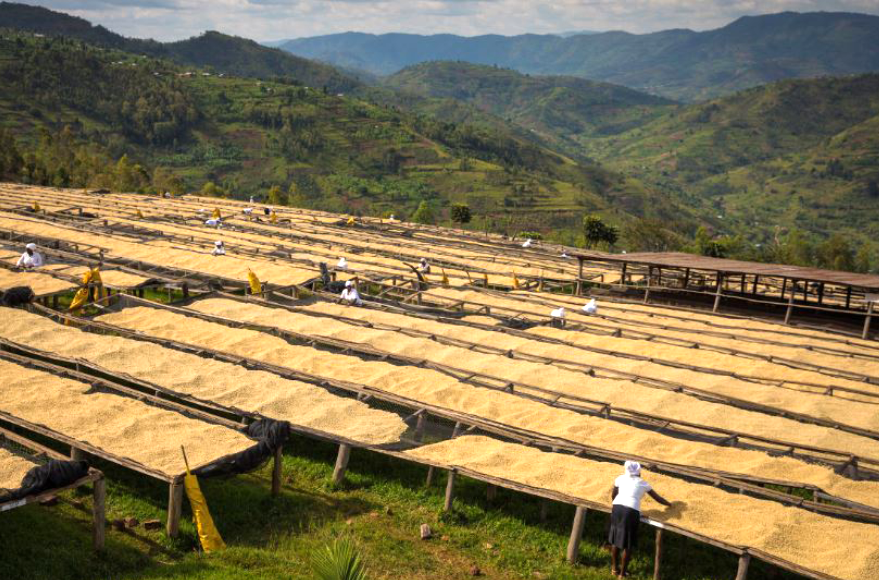
The producing areas of Arabica coffee beans in Rwanda are mainly distributed in the south and west, the Huye mountains and Nyamagabe areas in the south have some floral and citrus flavors due to their high altitude, while the Nyamasheke area on the bank of Lake Kivu in the west is rich in high-quality coffee with rich, fragrant and juicy taste. The main producing areas are:
Southern producing area: Huye, high altitude, coffee with floral aroma and citrus acid.
Western producing area: Lake Kivu Lake Kive, coffee taste is rich, with fruit juice taste.
Eastern producing area: Ngoma Lakes, Engma Lake District, with chocolate and fruity flavor.
Northern region: with citrus, nut, caramel flavor.
The Gesak coffee on the front street belongs to the Nyamasheke area on the bank of Lake Kivu in the west, which mainly belongs to bourbon mixed varieties.
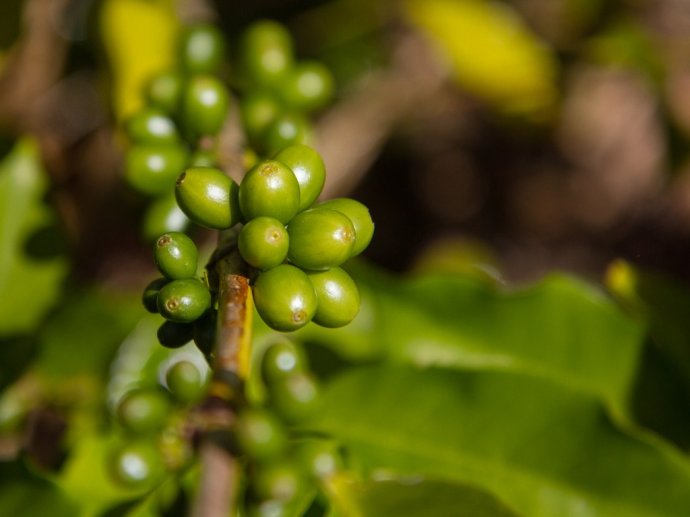
More than 90% of Rwandan coffee varieties are bourbon species introduced in the early days, as well as mixed varieties of the bourbon family, so this coffee tree has good disease resistance and can withstand general natural disasters. Bourbon coffee was initially popular throughout Latin America, but because of poor disease resistance and fewer countries grow, Qianjie Coffee currently buys several Latin American bourbon beans, including Brazilian red bourbon, Brazilian yellow bourbon and Colombian pink bourbon. By contrast, the Rwandan bourbon still enjoys an advantage, which is one of the reasons why the Front Street Coffee Club is on the shelves of Rwandan coffee beans.
Qianjie believes that the treatment of a bean is very important. Rwandan coffee is mainly washed. The general treatment process is as follows: the picked coffee fruit is floated to remove the low density coffee fruit, then the peel and pulp are removed, and then the pectin beans are fermented in the pool. The purpose of fermentation is to avoid destroying the coffee flavor. After the fermentation is completed, the pectin layer is washed with clean water, and finally the clean remaining sheepskin coffee beans are sent to dry. Some coffee is dried on the net bed for 15-22 days. Reduce the moisture content of raw coffee beans to about 11% to 13%.
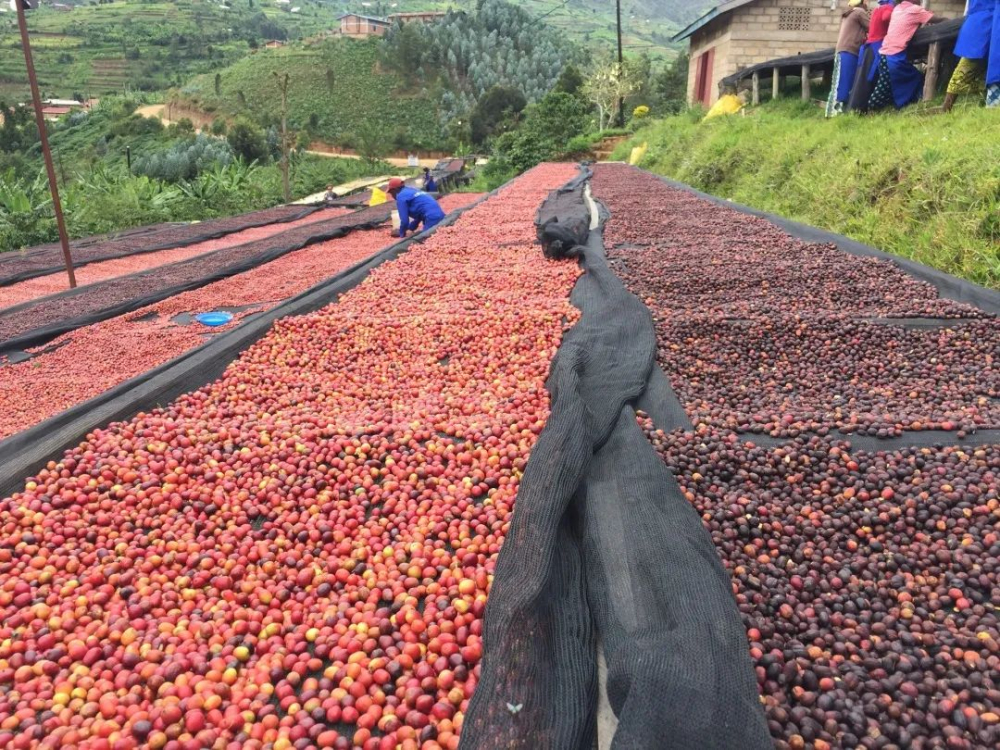
Rwanda pays great attention to the details of the washing process. After harvesting coffee cherries, their farmers pick out immature cherries, and only red cherries are sent to the sheller. Qianjie Coffee also believes that washed coffee has higher acidity, good cleanliness and stable overall performance.
Therefore, Qianjie coffee will first push the washed coffee beans when recommending coffee beans in a certain producing area, because washing is the treatment method that can best reflect the essential flavor of coffee, and can understand the flavor characteristics of the producing area by washing coffee beans. For Rwanda to adopt water washing treatment as the main way of treatment, Qianjie coffee is appreciated very much and thinks that this is a more wise choice.
Since then, coffee has developed rapidly in Rwanda, and in 2010, the Excellence Cup Competition was held, becoming the only country in Africa to hold the Excellence Cup Competition. Through the online bidding system of the excellent Cup, buyers are able to find the highest quality coffee batches and then introduce Rwandan coffee to the market. Just some time ago, Weiya helped our friend Rwanda in the studio, live with local coffee beans, which had a very positive impact on Rwandan coffee.

Rwanda did well in the COE, but was disqualified because of the smell of potatoes in two races. Maybe Qianjie readers don't understand what it means to have potato flavor in coffee beans. Qianjie is here to popularize science for you. In fact, the smell of potato is a sign of a defect in the quality of raw coffee beans, which can be smelled when raw beans are raw and when roasting or grinding ripe beans. People have different opinions on the reasons for the formation of potato flavor. Qianjie agrees that the formation of this flavor may be caused by bacteria left by insects in coffee fruit, causing great damage to coffee production. Fortunately, however, there is no potato flavor in the Rwandan beans in the front street coffee. So you can rest assured to come to Qianjie to buy this kind of beans.
Qianjie coffee is also after a lot of flavor awareness training to distinguish the flavor of coffee from Rwanda. Therefore, in order to highlight Rwanda's fresh acidity, rich taste, floral and citrus flavor, Qianjie coffee is roasted moderately and lightly, because the deeper the roasting, the more acidic the fruit will lose.
Here, please attach the details of this Rwandan coffee on Qianjie.
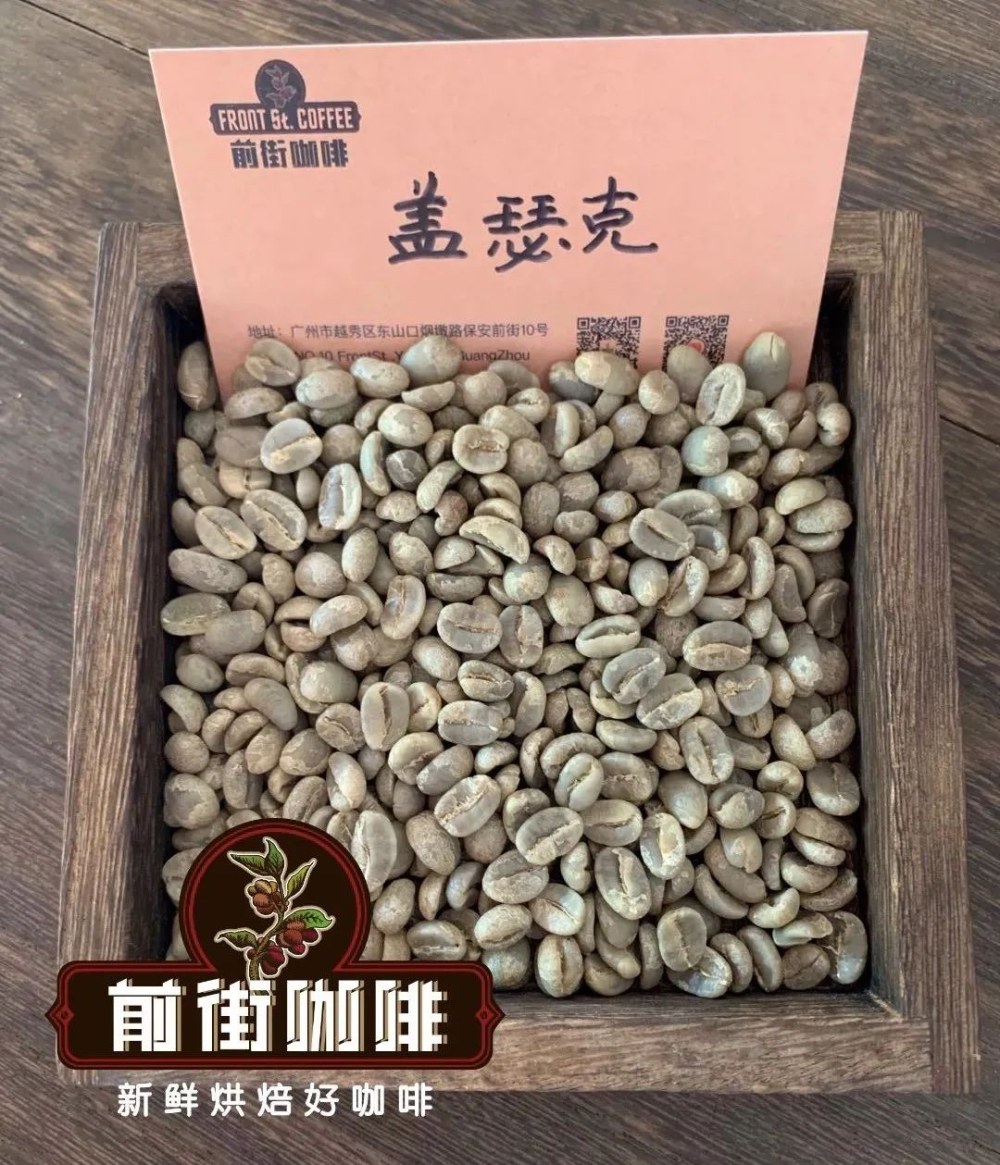
Front Street Coffee: Rwanda Gesak Coffee beans
Coffee producing area: Nyamasheke
Treatment plant: Gesak treatment plant
Planting altitude: 1700 to 2000 m
Treatment method: washing treatment
Coffee varieties: bourbon, Kaddura, Kaduai
Flavor: sweet citrus, bright acidity, berries and apples, honey sweetness in the middle, high sweetness and balance, almonds and chocolate finish.
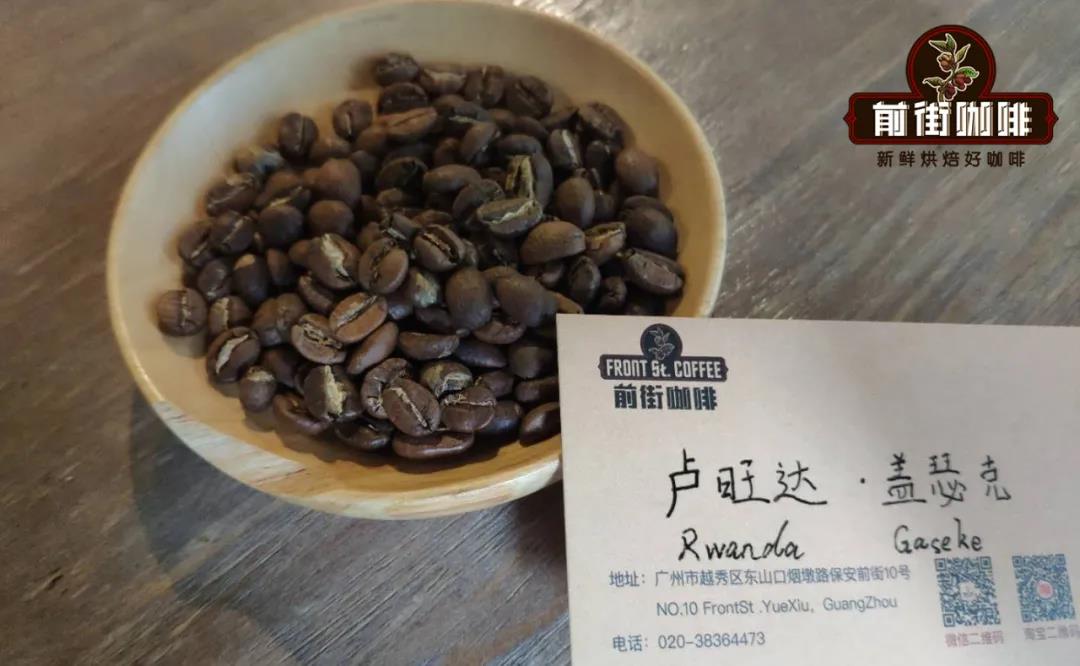
For more boutique coffee beans, please add private Qianjie coffee on Wechat. WeChat account: kaixinguoguo0925
Important Notice :
前街咖啡 FrontStreet Coffee has moved to new addredd:
FrontStreet Coffee Address: 315,Donghua East Road,GuangZhou
Tel:020 38364473
- Prev
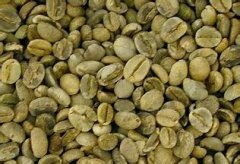
A brief introduction to the flavor and taste of the manor of the origin of Ethiopian Bancimaji coffee beans
Ethiopia, the grading and quality control system of coffee is divided into three levels: producer, regional and national. All coffee is inspected by local inspection agencies before leaving the country of origin, and then re-tested at the coffee inspection and grading centers in Addis and Diredawa to determine its quality grade. Coffee is graded before auction and sale, for all involved in production, acquisition and sale.
- Next

The production process of coffee beans in Rwanda: how is high-quality coffee produced?
Then the mechanic transported the coffee beans to the technology center near Chez. Some machines installed in warehouses on the hills remove the cutin from coffee beans. The staff sent the coffee beans to nearby research institutes for final quality control-manual sorting, which was carried out by several experienced women. After bagging and labeling according to its quality, the coffee beans can be stored in the warehouse to wait.
Related
- Detailed explanation of Jadeite planting Land in Panamanian Jadeite Manor introduction to the grading system of Jadeite competitive bidding, Red bid, Green bid and Rose Summer
- Story of Coffee planting in Brenka region of Costa Rica Stonehenge Manor anaerobic heavy honey treatment of flavor mouth
- What's on the barrel of Blue Mountain Coffee beans?
- Can American coffee also pull flowers? How to use hot American style to pull out a good-looking pattern?
- Can you make a cold extract with coffee beans? What is the right proportion for cold-extracted coffee formula?
- Indonesian PWN Gold Mandrine Coffee Origin Features Flavor How to Chong? Mandolin coffee is American.
- A brief introduction to the flavor characteristics of Brazilian yellow bourbon coffee beans
- What is the effect of different water quality on the flavor of cold-extracted coffee? What kind of water is best for brewing coffee?
- Why do you think of Rose Summer whenever you mention Panamanian coffee?
- Introduction to the characteristics of authentic blue mountain coffee bean producing areas? What is the CIB Coffee Authority in Jamaica?

